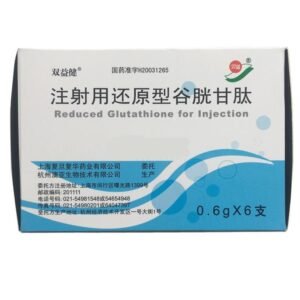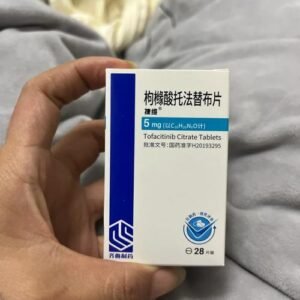tunlametinib tablets
The Class 1 innovative drug Tulametinib Capsules (trade name: Kolupin) applied by Kezhou Pharmaceuticals was conditionally approved for marketing through the priority review and approval procedure: it is suitable for patients with advanced melanoma with NRAS mutations who have failed anti-PD-1/PD-L1 treatment.
According to the press release, this is the first domestically produced MEK inhibitor and the world’s first targeted drug approved for the indication of advanced melanoma with NRAS mutations.
Tulametinib is a new ATP non-competitive MEK inhibitor targeting NRAS mutations. Compared with traditional MEK inhibitors, the biggest advantage of Tulametinib is that it is not cumulative.
MEK is a key member of the RAS/RAF/MEK/ERK signaling pathway and regulates several key cell biological activities, including proliferation, differentiation, migration, survival and angiogenesis. Dysregulation of this pathway is often found in many types of cancer (especially in cancer types with BRAF, KRAS and NRAS mutations).
The world’s first and only MEK inhibitor approved for the indication of NRAS mutation advanced melanoma
The first MEK inhibitor independently developed in my country
The ORR of the key phase II registration study was 34.7%, with best-in-class potential
The 2023 version of the CSCO melanoma diagnosis and treatment guidelines, tolametinib (HL-085) as a Class I recommendation for the treatment of advanced NRAS mutation melanoma
Kolupin (tolametinib/HL-085) is a highly selective MEK inhibitor independently developed in my country. It can bind to MEK1/2 in the RAS-RAF-MEK-ERK signaling pathway, blocking the conduction of downstream signaling pathways, thereby inhibiting tumor growth.
The results of the Phase II key registration clinical study of tolametinib for patients with advanced NRAS mutation melanoma were announced at the 2023 ASCO Annual Meeting.
A total of 100 patients with advanced NRAS mutation melanoma were included in the study, and tolametinib 12 mg was administered orally twice a day. 95 subjects were included in the efficacy analysis, and the primary endpoint – ORR confirmed by the independent imaging evaluation committee was 34.7%, the median PFS was 4.2 months, and the DCR was 72.6%. Among them, the ORR of patients who had previously received immunotherapy was as high as 39.1%. All patients were included in the safety analysis. The safety data showed that tolametinib was well tolerated and no unexpected adverse events were found. No AEs related to the study drug that led to death occurred in this study.
Approved indications: Advanced melanoma with NRAS mutations, suitable for patients with advanced melanoma with NRAS mutations who have failed anti-PD-1/PD-L1 treatment.
Dosage and administration: Colupin can be used for patients with advanced melanoma with NRAS mutations who have failed anti-PD-1/PD-L1 treatment. The recommended dose is 12 mg each time, taken orally twice a day (approximately once every 12 hours), either on an empty stomach or with meals.
About melanoma: Malignant melanoma (MM) is a highly malignant tumor originating from epidermal melanocytes or nevi. It mostly occurs in the skin and ranks third among skin malignancies. There are about 20,000 new melanoma patients in my country each year, with a median age of 50-69 years. In recent years, the incidence rate has shown a rapid upward trend, and the disease burden has increased year by year.
There are significant differences in the types of melanoma diseases between China and foreign countries. The skin type with a relatively better prognosis is the main type in Europe and the United States, accounting for about 90%, while the acral and mucosal types with higher malignancy are the main types in China and Asia, accounting for about 50% and 20%-30% respectively. NRAS mutation melanoma is a highly invasive, highly malignant, and rapidly progressive subtype, accounting for about 10.4-12.6% of all melanomas.
NRAS mutation melanoma has poor sensitivity to immunity and chemotherapy. Studies have shown that the overall ORR of Asian NRAS mutation melanoma patients receiving anti-PD-1 treatment is about 6.1%. No targeted drugs have been approved worldwide, and there is an urgent need to develop effective anti-tumor therapeutic drugs in clinical practice.
Warm reminder: For reference only, please follow the doctor’s advice for specific details!
Share:
Products
Our offers
Health Classification
Let us work together to protect precious health




























